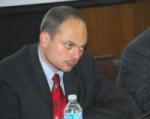
By Vladimir Kara-Murza
In recent years, the authorities in St. Petersburg have treated May 1 — when Russia traditionally marks International Labor Day — with uncustomary tolerance. It was the one day of the year when City Hall, otherwise given to harsh crackdowns on the opposition, grudgingly accepted political pluralism on the streets. Those days now appear to be over.
The rallies last Wednesday began in the usual way. Demonstrators from various political groups gathered near Moscow Station and headed off down Nevsky Prospekt, the city’s main street. The first to march were supporters of President Vladimir Putin and his United Russia party; needless to say, they encountered no difficulties. Neither did the communist and nationalist activists who followed them.
The problems began after that. The third group to march were the pro-democracy demonstrators. The United Democrats, a coalition formed for September’s municipal elections, and the liberal Yabloko Party had called on supporters to demand a free and fair vote, and thousands showed up in response. Just like the other groups, the democrats had a permit from City Hall. But almost immediately, the police moved in to try to remove the banners that read “Putin is not forever” and “St. Petersburg against United Russia,” as well as those directed against the interim governor, Alexander Beglov. The police then began viciously detaining participants. “An assault, it’s the only way to describe it,” said Boris Vishnevsky, an opposition lawmaker who spent the next few hours circulating among the police stations where detainees were taken. In all, 65 people were detained on Nevsky Prospekt. One participant had her arm broken by the police. A journalist with clearly marked media credentials was beaten up.
At a special court hearing convened at 1 a.m. — in itself a violation of the European Convention on Human Rights — the rally’s organizers, Andrei Pivovarov and Alexander Shurshev, were sentenced to 10 days in jail. Amnesty International has recognized them as prisoners of conscience, noting that “the Russian authorities proved unable to … respect the freedom of assembly even when they themselves had ‘permitted’ the rallies.”
Pivovarov and Shurshev will be released on Friday. Hundreds of others imprisoned by Russian authorities on political and religious grounds still face years of arbitrary detention. Last week, an international coalition of nongovernmental organizations released a major report on “the Kremlin’s political prisoners.” (Disclosure: I am a co-convener of this coalition.) According to the latest count by Memorial, Russia’s leading human rights group, 267 people are being held in prisons and penal colonies, and under house arrest for political or religious reasons. The estimate is incomplete, as it is based on the strict criteria for defining political prisoners established by Resolution 1900 (2012) of the Parliamentary Assembly of the Council of Europe. But it already exceeds the 126 Soviet prisoners of conscience named by Andrei Sakharov in his 1975 Nobel Lecture.
Russia’s political prisoners are a diverse group: They include opposition politicians, human rights activists, journalists, street protesters, religious believers, Ukrainian citizens. They include Oleg Sentsov, a filmmaker from Crimea who protested Moscow’s 2014 annexation of the territory; Anastasia Shevchenko, a single mother from Rostov-on-Don who became the first person indicted for membership in an “undesirable” political organization; Alexei Pichugin, the last remaining hostage of the “Yukos Affair,” who is now Russia’s longest-serving political prisoner; Memorial’s own regional leaders Oyub Titiev and Yuri Dmitriev; Ukrainian sailors seized in the Kerch Strait; and many others. (Note: Open Russia, the organization for which I work, was founded by Russian businessman Mikhail Khodorkovsky, the ex-chairman and CEO of Yukos.)
Politically motivated imprisonment is only one of many traits, domestic and international, that Putin’s regime shares with the Soviet Union. What is new is the seeming indifference of Western leaders to the plight of political prisoners in Russia. In Soviet times, American presidents of both parties demanded — and secured — the release of prominent prisoners of conscience. There are still people of principle in Western politics: Rep. Jim McGovern (D-Mass.) hosted the Washington launch of the political prisoner report, while former Canadian attorney general Irwin Cotler will represent Shevchenko as international counsel. Yet top-level meetings between Western and Kremlin officials are notable for the absence of any discussion of Russian political prisoners.
The NGOs behind the report have called on Western leaders to change that. They also called on parliaments and governments of democratic countries to use the relatively new tool at their disposal — targeted sanctions on human rights abusers — to provide at least some accountability for those who flout Russian laws and international legal norms by imprisoning people for “thought crimes.” “There has not yet been a sustained effort to sanction the officials responsible for the persecution of political prisoners,” the report concludes, identifying several such individuals beginning with Russian prosecutor general Yuri Chaika. “Unless serious consequences are imposed on these officials, the Kremlin will continue to believe it can act with total impunity.”
























